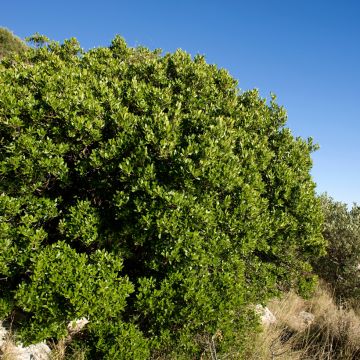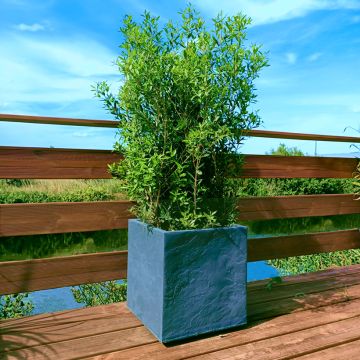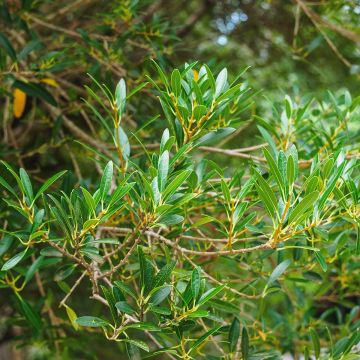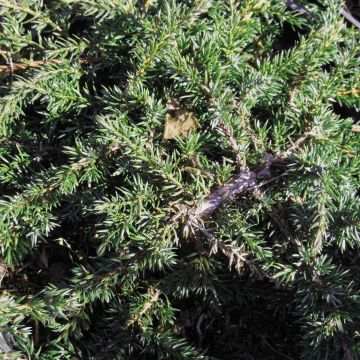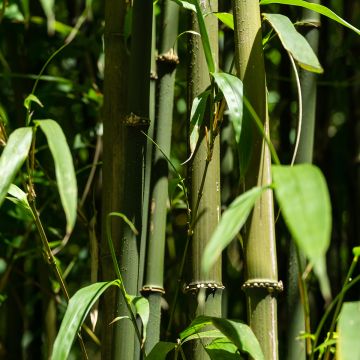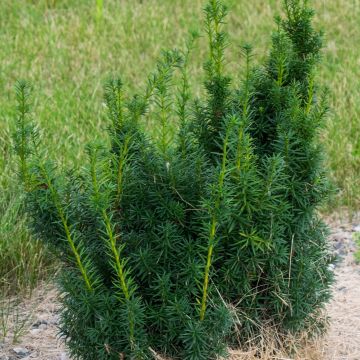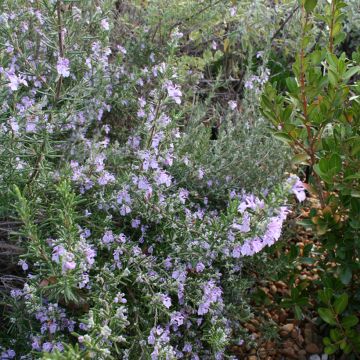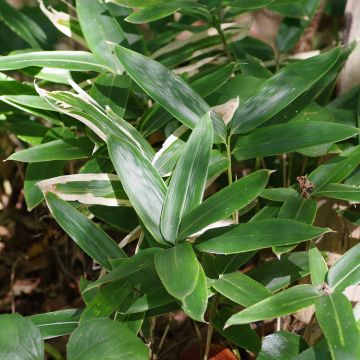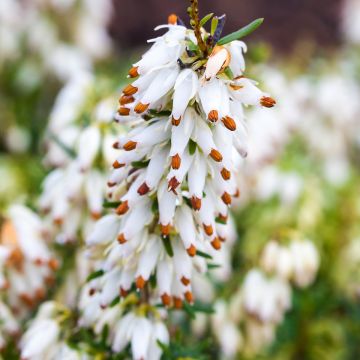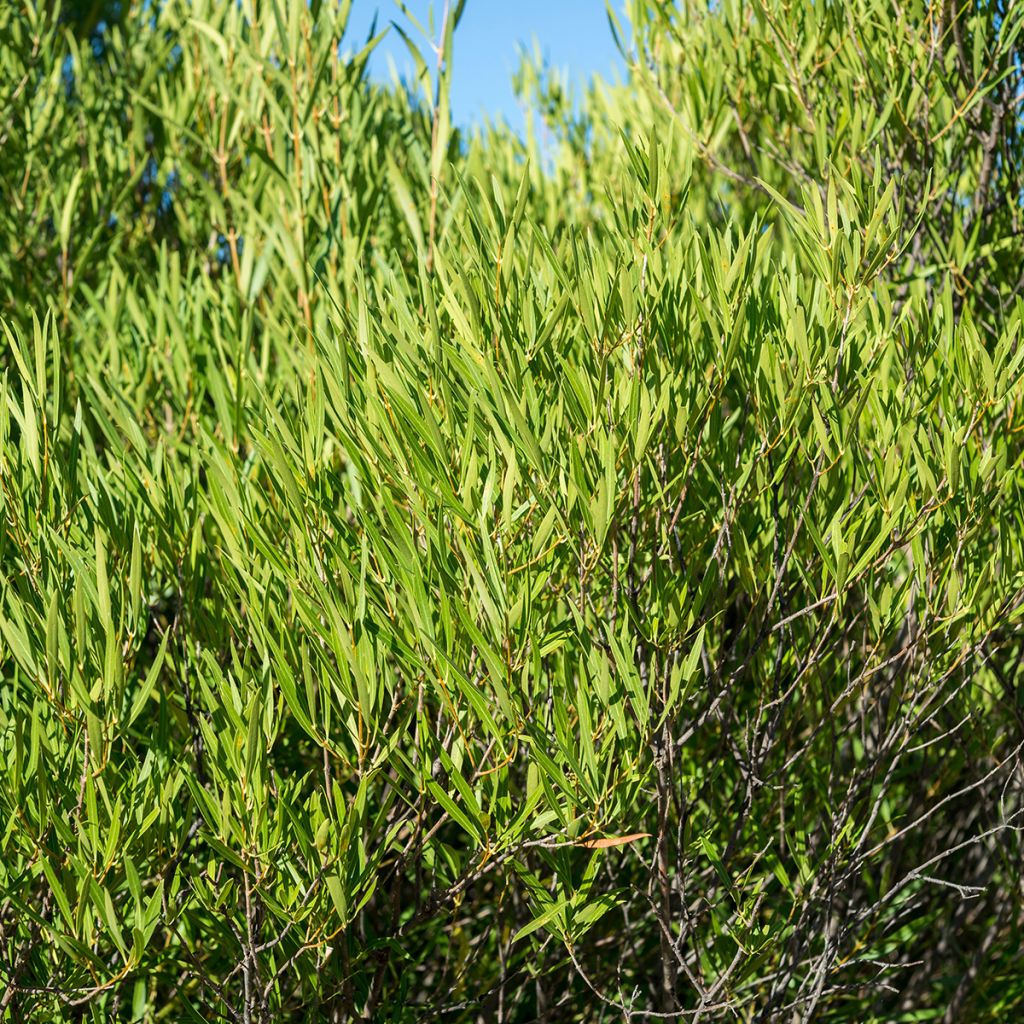

Phillyrea angustifolia Rosmarinifolia - Filaire à feuilles étroites
Phillyrea Rosmarinifolia - Mock Privet
Phillyrea 'Rosmarinifolia'
Mock Privet
This item cannot be shipped to the selected country
Delivery charge from €5.90
More information
Schedule delivery date,
and select date in basket
This plant carries a 24 months recovery warranty
More information
We guarantee the quality of our plants for a full growing cycle, and will replace at our expense any plant that fails to recover under normal climatic and planting conditions.
From €5.90 for pickup delivery and €6.90 for home delivery
Express home delivery from €8.90.
Does this plant fit my garden?
Set up your Plantfit profile →
Description
The Phillyrea angustifolia 'Rosmarinifolia' is a selection of the Narrow-leaved Phillyrea that is more compact than the typical variety, with a globose habit and narrower foliage. It is an evergreen shrub of Mediterranean origin, known for its robustness and drought resistance. Despite its unassuming appearance, this Phillyrea stands out in spring with the fragrance of its small, insignificant, honey-scented flowers, followed by bluish berries that resemble small olives but are not edible. Plant it in a hedge or use it as a substitute for boxwood in climates that are not too cold.
The Phillyrea is an evergreen shrub in the Oleaceae family, related to the olive tree and Osmanthus, native to the Mediterranean basin and the Middle East. In France, it is found in the undergrowth covering rocky hills, often associated with the holm oak, rooted in rocks but also tolerant of clayey and suffocating soils. Like the holm oak, it extends further north to the southwestern departments, for example in the Lot region. There are two species, Phyllirea angustifolia and P. latifolia. Their natural hybrid called P. (x) media can take on various forms. Rosmarinifolia is a form that has a small size, a distinctive spherical habit, and finer foliage compared to other Phillyreas.
The Phillyrea angustifolia 'Rosmarinifolia' naturally forms a rounded bush, branching from the base. Untouched, it does not exceed 1.75 m (6ft) in all directions. Its growth is quite slow in poor soil, slightly faster in deep and fertile soil. It produces bronze young shoots that become narrow and elongated, leathery leaves measuring 3 to 5 cm (1 to 2in) long and 0.5 cm (1in) wide. The upper surface is a fairly deep green, while the undersides are paler and velvety, they have a slight gloss. Flowering occurs from March to May depending on the region. The flowers are quite inconspicuous, not exceeding 1 cm (1in) and are cream-white with a greenish tinge. They are grouped in small clusters in the axils of the leaves, slightly fragrant and honey-scented. The flowering is followed by the formation of drupe fruits containing a non-edible stone, sought after by certain birds. They turn a blackish-blue color when ripe in autumn. This small tree can live for many years in poor and dry soil.
Very easy to cultivate, Phillyrea Rosmarinifolia only fears very cold winters when young. As it is not affected by sea spray, it can be adopted without reservation in coastal areas, especially in a small windbreak hedge. Like Pistacia lentiscus, laurel-tin, strawberry trees, myrtles, and Rhamnus alaternus, it is perfect for creating a free hedge or the persistent structure of a garden. These Mediterranean shrubs even tolerate shade and root competition. Also cultivate this Phillyrea in the undergrowth, alongside bear's breeches, Bupleurum fruticosum, or Choisya ternata. As it tolerates repeated pruning well, it can be used in topiary art to create original shapes.
Report an error about the product description
Plant habit
Flowering
Foliage
Botanical data
Phillyrea
'Rosmarinifolia'
Oleaceae
Mock Privet
Mediterranean
Other Phillyrea
Planting and care
The Phillyrea angustifolia Rosmarinifolia is a very tolerant bush in terms of soil and exposure. Nevertheless, to ensure a good start, it should be planted in well-prepared soil, allowing its roots to descend more rapidly. In hot and dry climates, it is preferably planted in early autumn, while in areas with borderline hardiness, spring planting is preferable. An adult bush can withstand short frosts of around -12/-15°C (10.4/5°F), in well-drained soil and sheltered conditions, regrowing from the stump when its vegetation has been damaged. Water abundantly, but spaced out, during the first two or three summers to help the bush establish well. Afterwards, it will not need any water at all during the summer, even in hot and dry regions. It is advisable to protect young plants with a winter veil if significant frosts are forecasted during the first winters. This Phillyrea accepts limestone and clayey soils very well in dry climates. It also tolerates slightly acidic soils, both compact and moist in winter if it does not freeze too much. This bush is very well adapted to drought and summer heat. It tolerates pruning very well, allowing it to be shaped into a hedge or topiary.
Planting period
Intended location
Care
This item has not been reviewed yet - be the first to leave a review about it.
Evergreen shrubs
Haven't found what you were looking for?
Hardiness is the lowest winter temperature a plant can endure without suffering serious damage or even dying. However, hardiness is affected by location (a sheltered area, such as a patio), protection (winter cover) and soil type (hardiness is improved by well-drained soil).

Photo Sharing Terms & Conditions
In order to encourage gardeners to interact and share their experiences, Promesse de fleurs offers various media enabling content to be uploaded onto its Site - in particular via the ‘Photo sharing’ module.
The User agrees to refrain from:
- Posting any content that is illegal, prejudicial, insulting, racist, inciteful to hatred, revisionist, contrary to public decency, that infringes on privacy or on the privacy rights of third parties, in particular the publicity rights of persons and goods, intellectual property rights, or the right to privacy.
- Submitting content on behalf of a third party;
- Impersonate the identity of a third party and/or publish any personal information about a third party;
In general, the User undertakes to refrain from any unethical behaviour.
All Content (in particular text, comments, files, images, photos, videos, creative works, etc.), which may be subject to property or intellectual property rights, image or other private rights, shall remain the property of the User, subject to the limited rights granted by the terms of the licence granted by Promesse de fleurs as stated below. Users are at liberty to publish or not to publish such Content on the Site, notably via the ‘Photo Sharing’ facility, and accept that this Content shall be made public and freely accessible, notably on the Internet.
Users further acknowledge, undertake to have ,and guarantee that they hold all necessary rights and permissions to publish such material on the Site, in particular with regard to the legislation in force pertaining to any privacy, property, intellectual property, image, or contractual rights, or rights of any other nature. By publishing such Content on the Site, Users acknowledge accepting full liability as publishers of the Content within the meaning of the law, and grant Promesse de fleurs, free of charge, an inclusive, worldwide licence for the said Content for the entire duration of its publication, including all reproduction, representation, up/downloading, displaying, performing, transmission, and storage rights.
Users also grant permission for their name to be linked to the Content and accept that this link may not always be made available.
By engaging in posting material, Users consent to their Content becoming automatically accessible on the Internet, in particular on other sites and/or blogs and/or web pages of the Promesse de fleurs site, including in particular social pages and the Promesse de fleurs catalogue.
Users may secure the removal of entrusted content free of charge by issuing a simple request via our contact form.
The flowering period indicated on our website applies to countries and regions located in USDA zone 8 (France, the United Kingdom, Ireland, the Netherlands, etc.)
It will vary according to where you live:
- In zones 9 to 10 (Italy, Spain, Greece, etc.), flowering will occur about 2 to 4 weeks earlier.
- In zones 6 to 7 (Germany, Poland, Slovenia, and lower mountainous regions), flowering will be delayed by 2 to 3 weeks.
- In zone 5 (Central Europe, Scandinavia), blooming will be delayed by 3 to 5 weeks.
In temperate climates, pruning of spring-flowering shrubs (forsythia, spireas, etc.) should be done just after flowering.
Pruning of summer-flowering shrubs (Indian Lilac, Perovskia, etc.) can be done in winter or spring.
In cold regions as well as with frost-sensitive plants, avoid pruning too early when severe frosts may still occur.
The planting period indicated on our website applies to countries and regions located in USDA zone 8 (France, United Kingdom, Ireland, Netherlands).
It will vary according to where you live:
- In Mediterranean zones (Marseille, Madrid, Milan, etc.), autumn and winter are the best planting periods.
- In continental zones (Strasbourg, Munich, Vienna, etc.), delay planting by 2 to 3 weeks in spring and bring it forward by 2 to 4 weeks in autumn.
- In mountainous regions (the Alps, Pyrenees, Carpathians, etc.), it is best to plant in late spring (May-June) or late summer (August-September).
The harvesting period indicated on our website applies to countries and regions in USDA zone 8 (France, England, Ireland, the Netherlands).
In colder areas (Scandinavia, Poland, Austria...) fruit and vegetable harvests are likely to be delayed by 3-4 weeks.
In warmer areas (Italy, Spain, Greece, etc.), harvesting will probably take place earlier, depending on weather conditions.
The sowing periods indicated on our website apply to countries and regions within USDA Zone 8 (France, UK, Ireland, Netherlands).
In colder areas (Scandinavia, Poland, Austria...), delay any outdoor sowing by 3-4 weeks, or sow under glass.
In warmer climes (Italy, Spain, Greece, etc.), bring outdoor sowing forward by a few weeks.

































